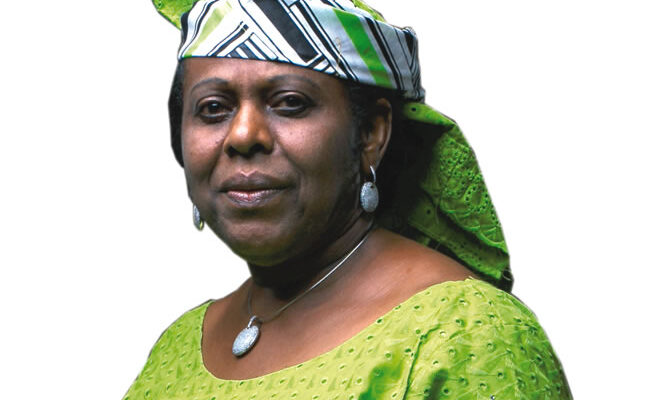Being the text of a Keynote Address delivered by Ambassador Dr Olatokunbo Awolowo Dosumu at the International Symposium on Digital Transformation and Public Service Delivery in Africa held at the University of Ibadan Business School on Thursday, March 30,2023.
CONTINUES FROM YESTERDAY

4.3 The Golden Rule of Public Service
The golden rule of public service is to treat others as you would like to be treated. This rule is based on the principle of empathy and recognizes that public servants should always strive to act with compassion, respect, and fairness towards the public they serve.

The golden rule of public service has several implications for how public servants should approach their work. First, it requires public servants to listen to the needs of the public and to be responsive to their concerns. This means that public servants should be open to feedback and willing to engage with citizens in a meaningful way. Second, the golden rule requires public servants to act with integrity and transparency at all times. Public servants must be accountable to the public and act in their best interests. They should avoid conflicts of interest, and always act with honesty and ethical considerations. Third, the golden rule demands that public servants treat all citizens with respect and dignity, regardless of their background or social status. This means that public services should be accessible to all citizens, and designed to promote equity and fairness.

5.0 Digital Transformation and Public Service Delivery
The purpose of digital technology is to make life easier and devoid of stress. Similarly, the essence of public service is to improve life and living. So, there is a nexus between digital technology and public service. Since public service has a ready framework through which it reaches the masses, the deployment of digital technologies would only result in the up-scaling of its service delivery and the improvement of life and living for the citizens. Although, as stated earlier, there are many derivatives of digital technology, for the purpose of this discourse, I want to focus on how Artificial Intelligence (AI) can impact critical public service sectors in Africa.
- 0 Using Artificial Intelligence in the Provision of Educational Service in Africa
UNESCO states that over one-fifth of children between the ages of about 6 and 11 in Africa are out of school, followed by one-third of youth between the ages of about 12 and 14. The United Nations agency adds that almost 60 per cent of youths between the ages of about 15 and 17 are not in school. So, the continent is way behind other continents with respect to education provision despite its abundant resources. Africa can only be great to the extent to which she trains her people. Africa should take a leaf from Taiwan, described as a barren rock in a typhoon-laden sea with no natural resources— it even has to import sand and gravel from China for construction — yet it has the fourth-largest financial reserves in the world. Taiwan has been able to achieve this feat because rather than digging in the ground and mining whatever comes up, Taiwan has mined its 23 million people, their talent, energy and intelligence — men and women. Because the country has no oil, no iron ore, no forests, no diamonds, no gold,just a few small deposits of coal and natural gas, it has developed the habits and culture of honing its people’s skills, which turns out to be the most valuable and only truly renewable resource in the world today.
Africa can do the same through the appropriate deployment of Artificial Intelligence. For obvious reasons, I intend to highlight the following sectors in particular: Education, Agriculture, Healthcare and the Economy. In doing so, I will mention some of the specific strategies, all of which, admittedly, would require considerable initial investment in basic infrastructure and capacity-building, that will need to be considered, among others:
6.1 Access to Education
AI can improve access to education by providing remote and low-cost learning options. AI-powered platforms can provide students with access to educational materials and resources regardless of their location or socioeconomic background.
6.2 Personalized Learning
AI can enable personalized learning by analyzing data on students’ learning patterns, preferences, and performance. AI models can also adapt learning materials and activities to meet individual needs, improving learning outcomes and engagement.
6.3 Teacher Support
AI can support teachers by providing them with tools to analyze student data, identify learning gaps, and tailor their teaching strategies accordingly. This can help teachers to provide more effective support to their students and improve learning outcomes.
6.4 Assessment and Evaluation
AI can help to assess and evaluate student learning more efficiently and accurately. AI-powered assessments can analyze data from multiple sources, including written and spoken responses, to provide more comprehensive and insightful evaluations of student performance.
6.5 Educational Research
AI can facilitate educational research by analyzing large amounts of data on learning outcomes, teaching strategies, and other factors. This can help researchers to identify trends and patterns, generate insights, and develop more effective education policies and programs.
7.0 Impact of Artificial Intelligence on Agriculture and Food Security
One of the major challenges confronting Africa is food insecurity. According to recent reports by the Food and Agriculture Organization (FAO) and the African Union (AU), an estimated 346 million Africans, including children, face food crisis occasioned by devastating farm and livestock losses as well as parched land. With the population of Africa growing at 2.7 per cent annually, the number of hungry Africans is likely to double by 2050, when the continent’s population is projected to be about 1.2 billion, unless the trend is arrested. This is because the rising population figure would result in reduced land space for agriculture with farm output being inadequate for the population. That is the bad news. The good news, however, is that with the deployment of appropriate digital technologies, especially Artificial Intelligence (AI), the drift could be arrested and even reversed.
7.1 Artificial Intelligence and Precision Agriculture
AI can be used to develop precision agriculture techniques, which involve using data analytics, sensors and other technologies to precisely measure and manage crops, irrigation, fertilizers, and other inputs. This can improve crop yields, reduce waste, and increase efficiency in resource use. These technologies save the excess use of water, pesticides, herbicides, maintain the fertility of the soil, help to improve productivity and enhance quality.
7.2 AI and Weather Prediction
AI can help predict weather patterns and other environmental factors that affect agriculture, such as soil moisture levels, temperature and humidity. This can help farmers make better decisions about planting, harvesting, and other activities, which can improve crop yields and reduce losses. AI can help with weather prediction by analyzing large amounts of weather data and identifying patterns that may be difficult for humans to detect.
7.3 AI and Pest Management
AI can help farmers detect pests and diseases early by analyzing images of crops and other data. This can help farmers take timely action to prevent or minimize damage, reducing crop losses. It can help with pest and disease management in agriculture by providing farmers with tools to detect, monitor, and control pests and diseases more effectively.
7.4 AI and Supply Chain Management
AI can be used to improve the efficiency of the supply chain for agricultural products. For example, it can help optimize logistics and transport, monitor inventory levels, and predict demand, ensuring that products reach their intended markets in a timely and cost-effective manner.
7.5 AI and Soil Quality Analysis
AI can be used to analyze soil quality data, such as pH levels, nutrient content, and organic matter content, which can help farmers make informed decisions about fertilizer use, crop rotation, and other practices that can improve soil health and productivity. It can improve soil quality analysis by providing farmers and other stakeholders with tools to analyze and interpret soil data more effectively.
88.0 Deployment of Artificial Intelligence in Healthcare Delivery in Africa
According to the World Health Organisation (WHO), there are not enough medical doctors in Africa to meet the health needs of its growing population. The ratio of doctors to patients, on average, is 1 doctor for 10,000 people. Coupled with weak infrastructure and poor hygiene, this is a dangerous trajectory for the healthcare of Africans. Clearly, as in all the other sectors, certain fundamentals must be put in place first (eg training and retaining enough healthcare professionals, constructing and equipping enough fit-for-purpose hospitals and clinics, etc), Subsequent to this, the use of Artificial Intelligence can improve health service provision in Africa in several ways, including the following:
8.1 Diagnosis and Treatment
AI can be used to analyze medical images, such as X-rays, CT scans and MRI scans to help diagnose diseases and conditions accurately. AI can also help clinicians to develop personalized treatment plans based on patients’ medical histories, symptoms, and genetic information.
TO BE CONTINUED TOMORROW
READ ALSO FROM NIGERIAN TRIBUNE








